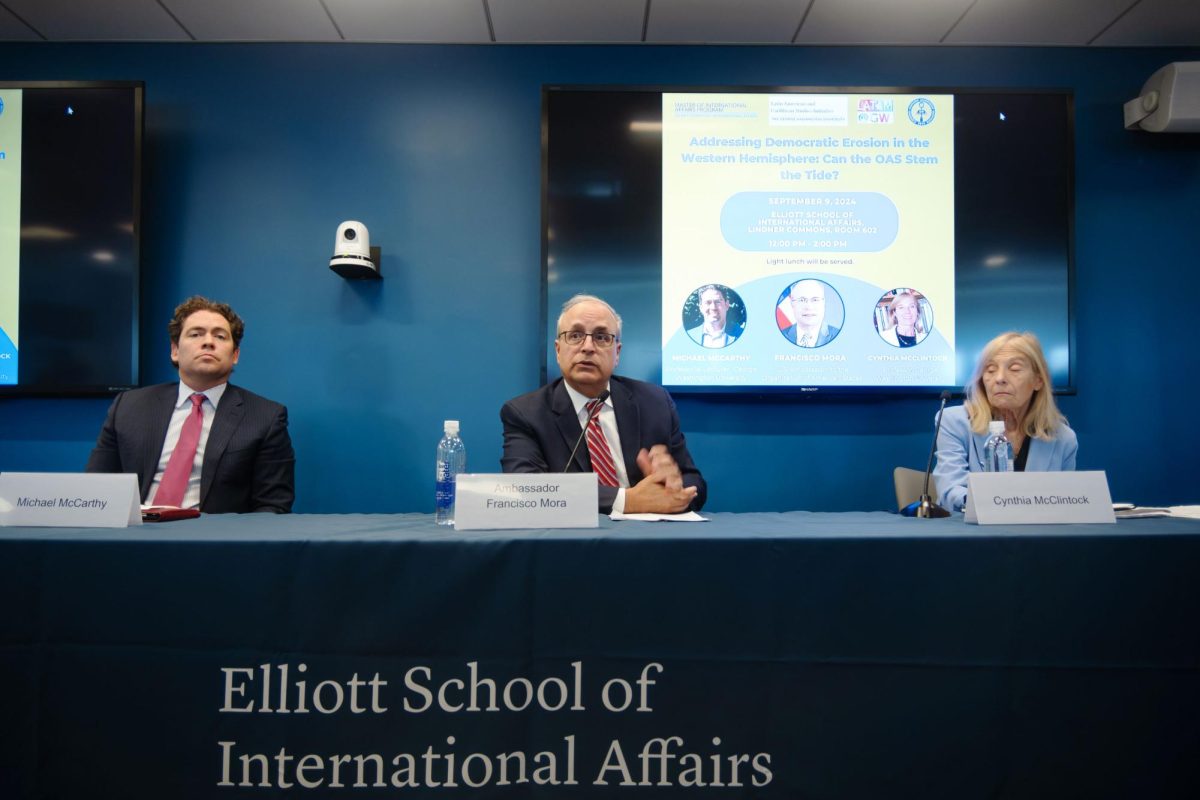Updated: Sept. 24, 2024, at 4:26 p.m.
The U.S ambassador to the Organization of American States discussed methods the group uses to combat threats to democracy at the Elliott School of International Affairs Monday.
U.S Ambassador Francisco Mora and Adjunct Professor of International Affairs Michael McCarthy reviewed OAS’s approach to combatting authoritarianism in North and South America by promoting democratic leadership, condemning disinformation and strengthening public diplomacy. The Latin American and Caribbean Studies Initiative hosted the event, which was moderated by Cynthia McClintock, a professor of international affairs.
The OAS, a regional organization established in 1889 and comprised of 35 countries, is the oldest regional organization in the world to form with the purpose of maintaining peace, justice and independence through diplomacy and cooperation. Countries like the U.S., Mexico, Canada, Panama and Guatemala are active members.
Mora said some countries in the Western Hemisphere are trapped in a “vicious circle” of eroding democracy, climate change, transnational crime and inequality because one issue catalyzes the others. Mora said it is difficult for the state to resolve each issue simultaneously, and results in citizens losing confidence in democratic leadership.
“People are disaffected, they are frustrated, they are discontented with the performance of democracy and not just in this hemisphere, but really around the world,” Mora said.
Mora said citizens’ declining faith in their countries’ democracies, a rhetoric that the 2008 financial crisis heightened, has caused many to consider the possibility that authoritarianism could me a more “effective” alternative to democracy. He argued the most effective way to combat a failing democracy is with the continuation of democracy and increased international cooperation as opposed to authoritarian rule.
“Around the world, we see elected leaders undermining electoral results, attacking independent judiciaries and cracking down on human rights, right?” Mora said. “ So it’s a bit of a challenge, nonetheless. But the way to address these challenges is not with less democracy, as we often hear, it’s more democracy.”
Mora presented five potential actions the OAS could take to address the challenges causing an erosion of democracy: strengthening the democratic charter, engaging civil society and youth, combating disinformation, investing in economic growth and enhancing regional security cooperation.
Mora also highlighted the need for a collective effort between member states to ensure the countries can protect themselves against the influence of armed militia groups who may attempt to control government policies and actions through coercion. He explained that as criminal organizations threaten countries’ rule of law, states can strengthen their authority by cooperating on regional security issues.
“Criminal organizations used to say that it had penetrated the government,” Mora said. “ No, they’re not penetrating it, they’ve captured it in a sense, some more than others.”
Mora also emphasized the Inter-American Democratic Charter — an agreement formed in 2001 by the OAS that affirms their shared commitment to democracy — as the “instrument” all OAS states use to confront threats to democracy. He said the document requires that all member states commit to defending and promoting democratic ideals.
McCarthy said the new rising threat to democracy, as highlighted in the 2001 Inter-American charter, comes when a democratically elected leader fails to govern democratically. He explained the prevalence of “presidential self couping,” which refers to when leaders consolidate their power under the executive and weaken democratic principles.
“That is one thing that we should keep in mind as scholars of International Affairs here, because the OAS set a very high bar for itself with the 2001 Inter-American Democratic Charter,” McCarthy said. “The idea that a presidential self coup would be considered tantamount to a military coup , in terms of the rules of the charter was quite frankly, revolutionary in terms of international standards for democracy.”
This post has been updated to correct the following:
The Hatchet incorrectly reported that LATAM@GW hosted the event. The Latin American and Caribbean Studies Initiative hosted the event. We regret this error.





